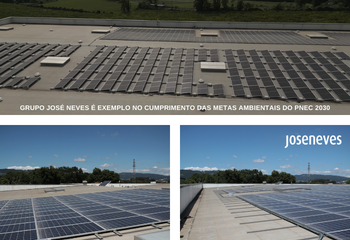José Neves reaches 10 years earlier the environmental goals of the PNEC 2030

José Neves looks to the commitment to renewable energies as a competitive strategy, ensuring that part of its energy needs are already provided by its Production Unit for Self-Consumption (UPAC).
With the investment made in the Production Unit for Self-Consumption, José Neves has already managed to avoid the emission of 154.99 tons of CO2. But the group does not stop there, reaching 10 years earlier the environmental targets set for 2030 with regard to the Green Deal (European Climate Pact) and the Paris Agreement on Climate Change / United Nations Framework Convention on Climate Change (UNFCCC) COP26 (Glasgow), as described below:
1. Environmental goals of the Green Deal (European Climate Pact) – electric power:
– Goal: ≥55% reduction in net greenhouse gas emissions.
– Deadline: 2030
– Results (in 2020): compliance with the Green Deal at 115.27%.
2. Paris Agreement on Climate Change / UNFCCC COP26 (Glasgow) – electric power:
– Goal: ≥45% reduction in CO2 emissions compared to 2010 (reduction of 1.5°C compared to the pre-industrial era).
– Deadline: 2030
– Results (in 2020): COP26 compliance at 140.89%.
Industrial companies cannot and should not be seen as enemies in the fight against climate change, but rather as crucial allies in the work to be done so that it is possible to achieve the proposed environmental goals and targets. Individual commitment is vital to achieving collective goals and at this level the business fabric can make a difference, with examples of good practices and awareness campaigns for a demanding and sensitive issue, but which will mark the future health of the planet and natural resources.
José Neves defends an environmentally friendly position in the market, ensuring a rational use of energy and resources and acts in the surrounding environment in a responsible manner as a promoter of sustainability, influencing behaviors of good practice and environmental protection in the course of its activities, promoting the circular economy.

